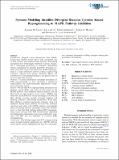Systems Modeling Identifies Divergent Receptor Tyrosine Kinase Reprogramming to MAPK Pathway Inhibition
Author(s)
Claas, Allison Mary; Atta, Lyla H.; Gordonov, Simon; Meyer, Aaron Samuel; Lauffenburger, Douglas A
Download12195_2018_Article_542.pdf (1.486Mb)
PUBLISHER_CC
Publisher with Creative Commons License
Creative Commons Attribution
Terms of use
Metadata
Show full item recordAbstract
Introduction - Targeted cancer therapeutics have demonstrated more limited clinical efficacy than anticipated, due to both intrinsic and acquired drug resistance. Underlying mechanisms have been largely attributed to genetic changes, but a substantial proportion of resistance observations remain unexplained by genomic properties. Emerging evidence shows that receptor tyrosine kinase (RTK) reprogramming is a major alternative process causing targeted drug resistance, separate from genetic alterations. Hence, the contributions of mechanisms leading to this process need to be more rigorously assessed.
Date issued
2018-07Department
Massachusetts Institute of Technology. Department of Biological Engineering; Massachusetts Institute of Technology. Department of Biology; Massachusetts Institute of Technology. Department of Chemical Engineering; Koch Institute for Integrative Cancer Research at MITJournal
Cellular and Molecular Bioengineering
Publisher
Springer US
Citation
Claas, Allison M., Lyla Atta, Simon Gordonov, Aaron S. Meyer, and Douglas A. Lauffenburger. “Systems Modeling Identifies Divergent Receptor Tyrosine Kinase Reprogramming to MAPK Pathway Inhibition.” Cellular and Molecular Bioengineering (July 26, 2018).
Version: Final published version
ISSN
1865-5025
1865-5033